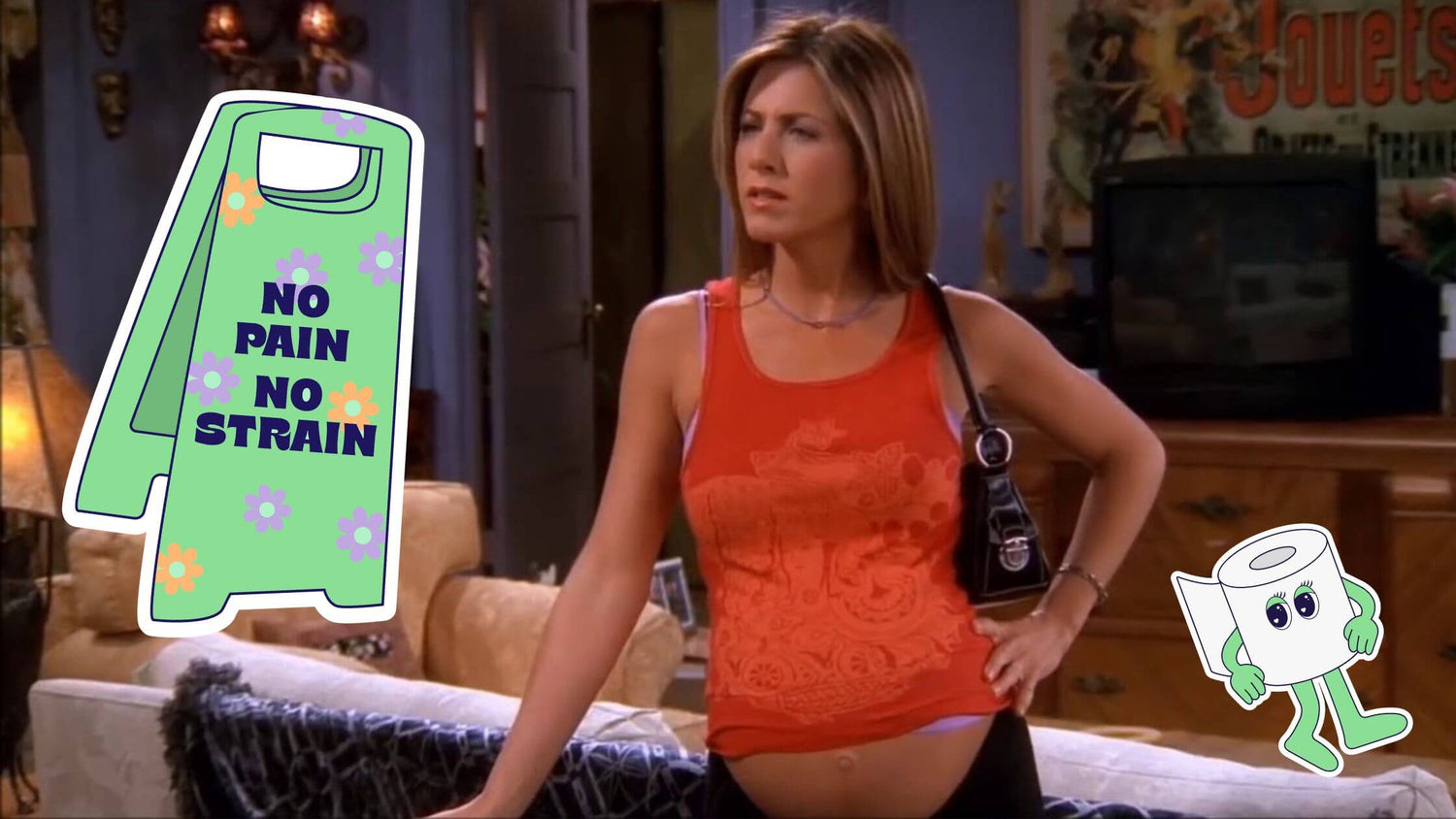What Is Pregnancy Constipation?
Pregnancy is one of the most exciting journeys you will ever embark upon, but it’s not free of challenges. In fact, if you speak to any parent, they’re likely to say having kids was one of the hardest (but most rewarding) things they have ever done.
For pregnant women, the major changes begin from the moment conception takes place. At the very start of pregnancy, their bodies begin to adjust to ensure the newly formed embryo can successfully implant into the uterine lining. Following this, their bodies start to grow and adapt to accommodate the growing foetus.
Aside from feeling physically bigger, pregnant women also have to deal with the symptoms of the significant hormonal changes that occur during pregnancy. One of the commonly overlooked hormone-related pregnancy symptoms is constipation.
Although a less spoken-about symptom, constipation affects the majority of pregnant women at some point during their pregnancy journey. It’s most common in the second and third trimesters but can occur at any time during the 40 (ish) weeks of gestation.
You might be reading this and thinking, ‘Yes, that’s me! Pregnant and constipated!’ Well, you’ve come to the right place because we’re going to cover everything you need to know about pregnancy constipation in this article.
We will discuss what causes you to become constipated in pregnancy, when it is most likely to affect you during pregnancy, how long it can last, and how to reduce or stop pregnancy constipation.
Why Does Pregnancy Cause Constipation?
Constipation can be defined as only passing three bowel movements a week when you would usually go to the toilet every day or every other day.
Usually, constipation is accompanied by abdominal discomfort or cramping before defecation, straining when you pass a stool, and passing hard, lumpy, dry stools. It can often lead to additional problems if it occurs in the long-term, such as haemorrhoids and anal fissures. Just like constipation, both haemorrhoids and anal fissures are relatively common for pregnant women and many women experience these problems after birth due to excessive straining and pushing during labour.
There are so many things that can cause constipation in the everyday individual. However, during pregnancy, we can blame hormones (for the most part).
Progesterone
In particular, it’s a hormone called progesterone that is the culprit when it comes to pregnancy constipation. Progesterone gradually increases during the first trimester of pregnancy and remains high throughout the entire second and third trimesters.
Progesterone is absolutely essential for the health, growth, and development of a growing foetus inside the womb. However, it can cause a number of nasty symptoms, one of which is constipation and another of which is bloating.
One of progesterone’s main roles is to relax smooth muscles in the body. Since there is smooth muscle in the digestive tract, these relaxing effects can cause digestion to slow down. Food moves more slowly through the intestines, allowing the colon to absorb more water from the stool. Less water means a harder, drier stool that is much harder to pass, leading to constipation.
The expanding uterus
At the same time, the increasing size of the foetus and uterus contributes to constipation. The expanding uterus pushes against the digestive tract and reduces the amount of room that ingested food has to move through the colon. This leads to sluggish digestion, hormonal bloating, and constipation.
Supplements
Another factor that can increase constipation in pregnancy is supplementation. Many pregnant women choose to take prenatal vitamins and folic acid supplements to optimise their health and their growing baby’s health. However, some supplements can negatively impact digestion and cause things to slow down in the colon, causing constipation, bloating, and abdominal discomfort.
Dehydration
For some women, drinking water and remembering to hydrate their bodies can be difficult during pregnancy due to the nausea of a busy schedule. Dehydration is another common cause of constipation in pregnancy, as it reduces the amount of water in the stool and makes it harder to have a bowel movement.
When Does Constipation Happen During Pregnancy?
Constipation is normal for women anywhere from eight weeks into their pregnancy when progesterone levels are beginning to rise. However, pregnancy constipation is most common in the third trimester (from week 27 to week 40) due to the increased pressure that the foetus puts on the digestive tract.
Many women experience constipation postpartum, too, as their bodies take time to settle back to normal, and their hormone levels are slowly adjusting to the body’s post-pregnancy demands.
You might find that if you take a holiday during pregnancy, you experience more bloating. Holiday bloating is a common issue for non-pregnant people but can be even worse when you’re expecting due to the significant hormonal and physical changes occurring in your body.
How Long Does Pregnancy Constipation Last?
Constipation affects between 16 and 39% of pregnant women. However, the amount of time a woman experiences constipation during her pregnancy depends on a variety of factors.
Some women don’t get constipated at all, and others experience it for a brief period of their pregnancy. For some women, it’s an ongoing issue throughout their entire pregnancy journey and even for a few months afterwards.
How to Stop Constipation During Pregnancy
If you’re dealing with constipation during your pregnancy, you’re probably wondering what you can do to try and reduce it or even get rid of it completely. Below, we’ve got some top tips for reducing or stopping pregnancy-related constipation and bloating.
Increase your levels of probiotic bacteria
Probiotics are live bacteria, such as Bifidobacterium, Lactobacillus, and Enterococcus. Although many of us are brought up to think that bacteria are scary and bad, they’re not all dangerous!
Probiotic bacteria are extremely beneficial (or essential) for a healthy gut. They perform a variety of functions that improve digestion, boost digestive health, increase vitamin production, and minimise toxin production.
One of the main causes of constipation during pregnancy is the slowing down of food (reduced intestinal transit). Probiotic bacteria can counteract this effect and speed up the rate at which digested food moves through the intestines, preventing it from becoming stagnant and turning into hard, dry stools.
You can eat probiotics in a variety of foods, usually fermented foods and drinks like miso, sauerkraut, kefir, yoghurt, and kombucha. Alongside these foods, consider adding a probiotic supplement into your daily routine to increase the number of probiotic bacteria that reside in your gut and reduce the risk of constipation.
At Wild Dose, we have formulated the perfect probiotic supplement that can minimise hormonal bloating, get rid of excess gas, and keep pregnancy constipation at bay. A Dose For Bloating contains two billion probiotic bacteria, which is double the threshold for a probiotic supplement to be effective.
Eat more prebiotic fibre
Prebiotics are types of fibre that probiotic bacteria feed on. Consuming more of these fibres in your diet can support your gut health by fuelling the probiotic bacteria in your colon and enabling them to work more efficiently.
You can find prebiotic fibres in traditionally healthy foods like whole grains, fruits, vegetables, nuts, and seeds. Adding more of these types of foods into your meals and snacks will optimise your gut microbiome composition, favouring more probiotic bacteria and less pathogenic bacteria. As a result, you will experience less bloating, constipation, and digestive symptoms during your pregnancy.
Of course, many of the prebiotic-containing foods are also packed full of nutrients that can improve your overall health and well-being during pregnancy, increasing the chance of a healthy labour and an even healthier newborn.
Cut back on dietary sodium
Sodium is an essential mineral for the human body. It’s vital for nerve impulse transmission, skeletal muscle relaxation, and fluid and electrolyte balance.
Because of sodium’s role in fluid regulation, it has the ability to pull water from one place to another. Consuming too much sodium in your diet causes your blood sodium levels to increase. This results in more water getting pulled out of your colon and into the bloodstream to counteract the increased sodium concentration.
Less water in your colon means a harder stool and an increased risk of getting constipated. Therefore, avoiding excess dietary sodium could be the key to minimising constipation whilst you’re pregnant.
If you normally eat a healthy diet and barely ever touch junk foods, you probably don’t need to worry too much about your sodium intake. However, if you enjoy weekly takeaways or often choose ready meals for dinner, you might benefit from cutting back on these foods as they tend to be high in sodium. Reducing your intake of takeaways and ready meals could relieve your constipation naturally and make you more comfortable during pregnancy.
Figure out your trigger foods and avoid them whenever possible
Every pregnant woman is different. The foods that make you bloated and constipated could be completely different to those of your pregnant friend. Identifying your constipation trigger foods is key to reducing the frequency and severity of your digestive issues.
Common dietary triggers of digestive issues include:
- Sugary fruits like bananas, apples, and pears
- Cruciferous veggies like broccoli, cabbage, cauliflower, and kale
- Legumes and beans of all kinds
- Fermented products like sauerkraut, tempeh, and miso
- Gluten-rich foods, such as pasta, noodles, and bread
- Dairy products, such as milk, cheese, yoghurt, and ice cream
- Chocolate, especially white and milk chocolate, due to the higher fat content compared to dark chocolate
- Chewing gum
- Carbonated drinks, including sodas, sparkling water, and energy drinks
You might have noticed that most of these common trigger foods are actually really healthy and full of nutrients. We even mentioned earlier in this article that fermented foods like sauerkraut are amazing for your digestive health because they contain probiotics.
However, if these foods regularly cause digestive issues for you and exacerbate your constipation, you might need to consume them in moderation. It’s all about finding a balance that works well for you. Unfortunately, there’s no simple answer, and it's all about trial and error!
Reduce your caffeine intake
Coffee and tea lovers, we’re talking to you! It’s recommended that you consume no more than 200 mg of caffeine a day during pregnancy, as it can increase the risk of gestational diabetes, gestational hypertension, and pre-eclampsia.
To avoid these pregnancy-related health conditions, it’s best to cut back on drinking caffeinated coffee, tea, and energy drinks. Reducing your caffeine intake can also benefit your digestion during pregnancy, as caffeine is a diuretic that causes you to pass more urine.
When you pass more urine, it’s easier to become dehydrated and get constipated. Therefore, removing diuretics from your diet as much as possible can tackle pregnancy constipation and make it easier to hydrate your body properly.
Get your body moving
Exercise is essential for a healthy pregnancy. Not only does it prevent your joints from feeling stuff and your muscles from aching too much as your growing baby gets bigger, but it also promotes better cardiovascular and respiratory health during pregnancy. Studies show that women who exercise regularly whilst they’re pregnant have a faster postpartum recovery, and many also have easier labour (if labour can ever be ‘easy’!).
As you reach your third trimester, high-intensity exercise like running probably isn’t feasible. This is especially the case if you’ve been diagnosed with gestational hypertension or pre-eclampsia. If you are already at an increased risk of pregnancy-related complications, the last thing you should be doing is increasing your blood pressure even further with intense exercise.
We recommend choosing lighter forms of exercise that are just as beneficial for your health as running. Consider going on daily walks to keep your body moving.
Yoga is also a great option to maximise your strength (especially your pelvic floor strength) and maintain a good level of flexibility during pregnancy. Being strong and flexible can benefit you during labour and promote an easier recovery after birth. There are so many great pregnancy yoga YouTube channels that post a range of prenatal yoga routines that are suitable for those of you in your first, second, or third trimesters.








